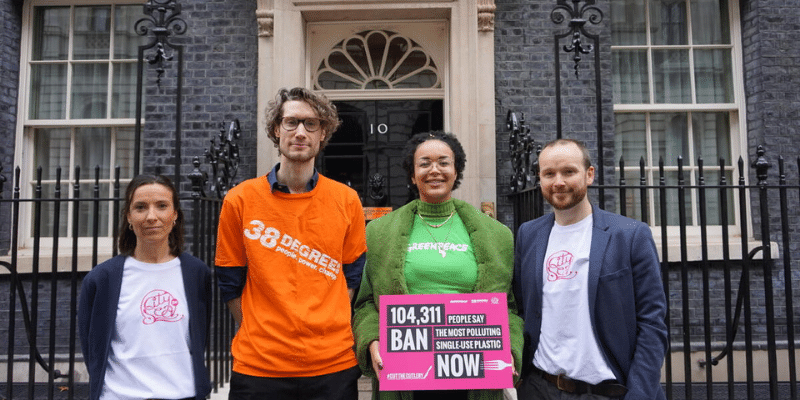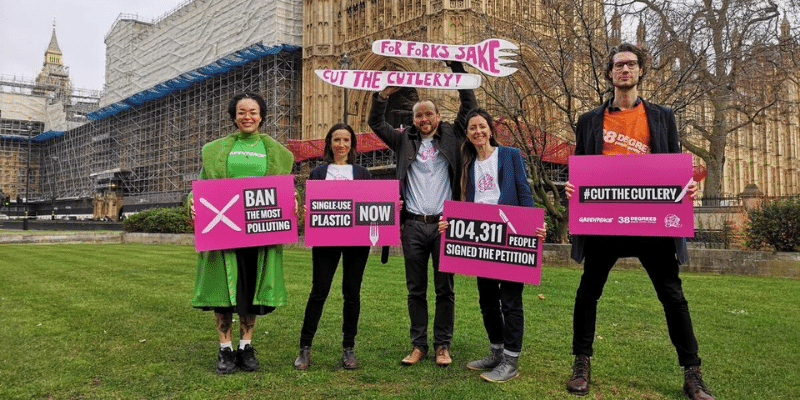A fork in the road in tackling plastic pollution
Wow. Over 118,000 of you signed our petition and over 50,000 of you took the time to respond to the Defra consultation supporting the ban on some of the most polluting plastics. In less than 6 months we’ve gone from the government being silent on this to them now planning to ban these polluting plastics. THAT is people power in action.
We went armed with your signatures and support straight to the heart of government. Our placards and cutlery props outside Number 10 made for an awesome photo opportunity that got great media coverage – just to REALLY make sure Boris was listening.
“There’s no doubt about it – this is an absolutely massive show of public support for finally banning these unnecessary and polluting plastic items. The fact that more than 50,000 people have taken the time to participate in a detailed government consultation on this issue is the clearest demonstration yet that we are simply done with these plastic items polluting our environment.”
World misleaders
Government spokespeople will tell us that because they are banning these plastics, this makes them ‘world leaders’ in tackling plastic pollution. We think not. At least not yet. That’s why we wrote an open letter with Allison Ogden-Newton OBE, Chief Executive at Keep Britain Tidy, and Jamie Peters, Interim Director of Campaigning Impact at Friends of the Earth, to the Environment Minister, George Eustice, outlining the next steps we felt government needs to take if they are serious about tackling plastic pollution. The letter argues that the Government needs to go beyond just banning the odd item and instead set ambitious targets in the Environment Act.
These, we argued, must include:
- An at least 50% reduction in non-essential single-use plastics by 2025.
- An overarching plastics reduction target, including but not limited to single-use plastics. This would ensure a progressive reduction in the overall use of all non-essential plastics, building towards preventing plastic pollution of the environment as far as possible by 2042. This must address those harder to tackle plastics from vehicles tyres and brakes and from clothes among others, and the specific problem of microplastics.
- Reuse targets of at least 25% of packaging being reusable by 2025, rising to 50% by 2030. This would guarantee that a large proportion of the reduction in plastic pollution is met by an increase in the market share of reusables, and make sure substitutions of single-use plastics for other damaging single-use materials are avoided.

No excuse for single-use
The first step is to set a legally binding target to reduce single-use plastics by 50% by 2025. Sure, the ban on the most polluting items will go some way towards this. But it’s also an acknowledgement that our waste and resource systems are stretched to breaking point and we cannot just recycle our way out of this crisis. We need to reduce the amount we produce. When we are flooding the world with plastics, we can’t just mop the mess up – we also need to turn the taps off.
A teeny weeny massive problem
Secondly, we called for an overarching plastics reduction target, including but not limited to, single-use plastics. This acknowledges that a lot of plastic pollution does not come from plastics we can see and touch like bottles and plastic forks, but are actually microplastics and nanoplastics that are shed directly from clothing and car tyres. This isn’t small change either – the microplastics from car tyres are responsible for more than 200,000 tonnes of microplastics entering our oceans every year. A recent study that found nanoparticles dating back to the 1960s at both poles were surprised to find a quarter of the particles were from vehicle tyres. Yikes!
And this is why we sought reassurance and sight of the government’s plan to tackle plastic pollution in its entirety, not just as a waste and resource question. Do they even have one? Good question!
In our letter we, politely, pointed out that there was already one in place in the form of the Plastic Pollution Bill that is due back for its second reading on March 18. This isn’t the only way of tackling the issue, but it is a concrete and well thought out example of a legislative approach to tackling plastic pollution in its entirety. At the moment, we don’t know if the government has an equivalent plan in place. If not, it needs one urgently. And if it does, we urgently need to see it so that we can feed into it and make it as good as possible.

Reuse, not more excuse
Lastly, we called for a reuse target of at least 25% of packaging being reusable by 2025, rising to 50% by 2030. We simply can’t talk about plastic pollution and a reduction in single-use plastics without talking about increasing the market share of reuse and refillable packaging. For consumers, this could be normalising refilling water bottles from public fountains, drinking coffee from reusable cups or topping up cereals from supermarket dispensers.
We know from our own research that there is consumer demand for this. The people have spoken – and they want change!
- Three out of four people (74%) would like to see more refill options, for things like dried foods, laundry detergents and take-away coffees, available to them so they can limit the amount of single-use plastic in their lives.
- More than half of all people (55%) think supermarkets and big-name brands are not doing enough to address plastic pollution.
- 81% of Brits want the UK government to make refillable products easier to buy and more widely available, as a main priority for reducing plastic pollution.
We also know there is movement in the markets towards these solutions. Coca-Cola this week announced a commitment to 25% of packaging to be reusable by 2030 (something that we welcomed with healthy scepticism here). What we now need is for government to commit to legally binding targets to give smaller and medium-sized businesses the confidence and reassurances they need to invest in these systems. This answers not only a consumer demand, but a planetary ecological necessity.
Keep the pressure on
The next 6 months are crucial – and what we have outlined here is a pathway for government to take to show it is truly committed to tackling the plastic crisis (before anyone comments “what about the climate crisis?”, it’s important to remember these are two sides of the same coin).
While some might sneer at the small steps that are being taken to tackle plastic pollution, we see them as important movement. This is a rolling start for a much bigger journey. But if Defra wants to convince us that they are serious, they need to show some urgency in these first steps and to also signal that they understand the length of the journey that they are on. If they can show they are travelling the right path, then we are there as a partner to travel with – and to help carry the load. But… if they fall from the tracks, we won’t hesitate in telling them where they’ve gone wrong and supporting them to get back on track.
Our ability to campaign for change rests with you. When over 50,000 of you responded to Defra’s consultation it almost broke their system! But believe us, it made them sit up and take notice.
We are a small but mighty not-for-profit organisation based in Bristol. We do so much of our campaigns on a shoestring, roping in help from amazing partners and supporters. And now we need your support. We have SO many more plans to hold this government to account but need your help to keep going.

